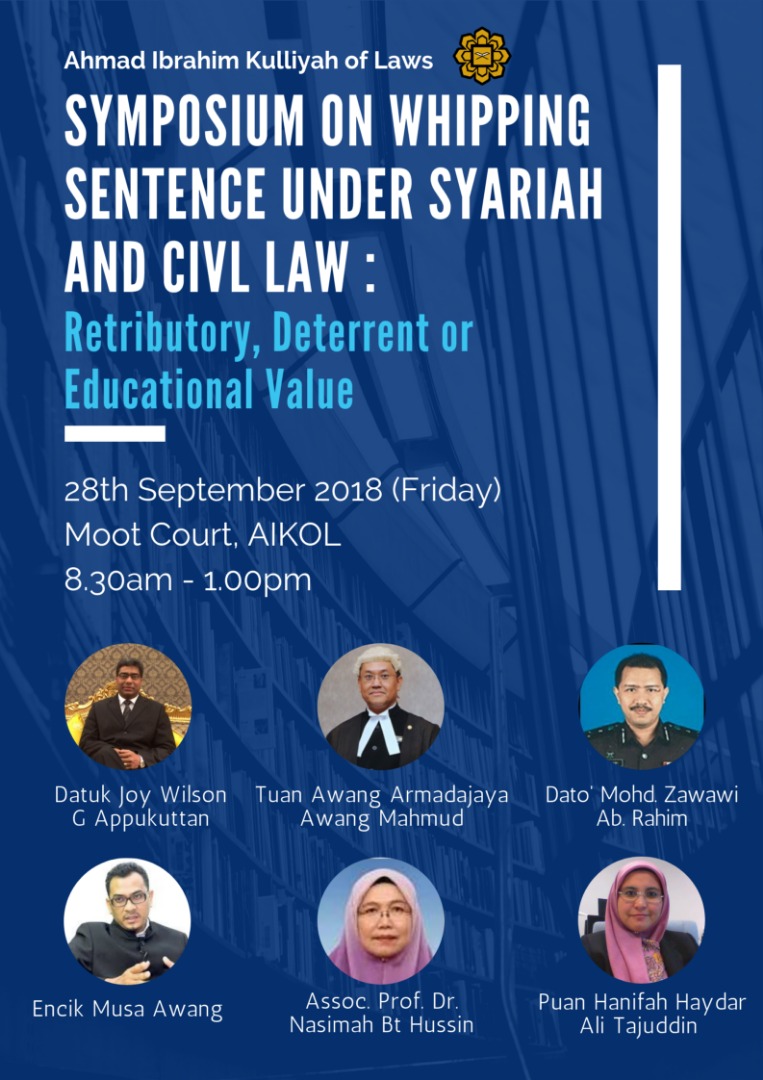By Nabilah ‘Athirah Mohamad
GOMBAK, 30 September 2018: The recent sensationalised whipping sentence in Terengganu, which created an uproar all over the world and raised numerous opinions and questions regarding the punishment, was discussed in the œSymposium On Whipping Sentence Under Syariah and Civil Law: Retributory, Deterrent or Educational Value held at IIUM on Friday (28 September).
Organised by the Ahmad Ibrahim Kulliyyah of Laws (AIKOL), IIUM, the forum reviewed significant issues raised including from the legal perspective, Syariah and civil law, the effectiveness of the punishment, and also from the human rights perspective.
The symposium was divided into two parts which began with presentations from the invited speakers and forum at the end of the programme. Focusing on the value of the controversial law, each panel presented their ideas, opinions and also factual evidence regarding the enacted law.
The presenters were from Syariah officer from the Department of Syariah Judiciary Malaysia, Hanifah Haydar Ali Tajuddin; Course Coordinator of Islamic Criminal Law AIKOL, Assoc. Prof. Dr. Nasimah Hussin; Officer of Malaysian Prison Department, Hj. Abdul Kadir Jailani; and a senior member of the Malaysian Bar and a practising lawyer, Datuk Joy Wilson G Appukuttan.
Meanwhile, the panels for the forum at the end of the programme were Musa Awang, President of Syarie Lawyer Malaysia, and Awang Armadajaya Awang Mahmud, Chairman of Advisory Board of the Prime Ministers Department, Malaysia. The forum, moderated by Dr. Ismail Yunus, a lecturer from AIKOL, discussed the degree of whipping in serving its purpose.
The concept of Whipping in Syariah
Hanifah Haydar in her presentation, outlined the concept of whipping in Syariah and civil perspective, saying that the term ˜whipping was from the mediaeval practice which most of the time will cause death to the offender. This created misconception upon it from people outside Malaysia.
œThe moment you say ˜whipping, people outside the country will have a perception like those of the practice from the medieval time. They wont be looking at the details of the execution of whipping such as the material, the force or the condition of the offender.
She added that the term ˜whipping should be changed to ˜caning which describes a more accurate meaning to the punishment.
She shared: œThe true meaning of whipping in Syariah is always to encourage moderation which mainly to educate and discipline the offender and other people as well.”
“According to the current Syariah Criminal Law procedure, the case of Terengganu followed the correct provisions. However, due to the sensationalisation from the media, the uproar is unfair towards the Syariah law whereas the whipping in civil law is more severe.
Whipping of Women in Islamic Countries
While the recent whipping sentence in Terengganu has sparked a condemnation towards the Syariah law of being barbaric and inhuman towards female, Dr. Nasimah highlighted her presentation on the issue according to Islamic Criminal Law, based on Surah An-Nur verse 2, which contains commandment to whip female or male offender without any gender discrimination.
She said, œIn Islam, the imposed punishment acts as the last resort after internal and external controls including inculcating faith in the offender.
Theres also a description of similar punishment of whipping in Kanun Melaka and engraved on the Batu Bersurat. This shows that there is no difference of punishment for male or female offender in Islam.
She explained that Islamic countries such as Aceh, Brunei, Saudi Arabia and Pakistan also practised similar punishment of whipping women.
She concluded: œThe main difference between Syariah and civil law, is the basis. In Islamic law, any crime that goes against the ‘akhlak’ is liable for punishment. There is no victim in Islamic Criminal Law such as consuming alcohol and committing adultery which is different from the man-made law.
Effectiveness on Syariah and Civil Whipping
Meanwhile, Hj. Abdul Kadir shared his experience of being the officer-in-charge of executing the whipping sentence in Malaysian prison so he could clearly explain the conditions behind bars.
Hj. Abdul Kadir commented: œThose who condemned the whipping sentence, did they watch it by themselves? It is weird that they could make such comments whereas the law has been enacted since long time ago. There should be no issue against it anymore.
He shared the difference of whipping procedure which is different between Syariah and civil crime. œThey are obligated to go through a health screening before receiving the punishment. For a female, there is a special clothe for them to wear which lessen the scars. Even the executor is being assigned based on the gender of the offender unlike under civil law.
On his capacity as part of the Prison Department, he described the effectiveness of whipping sentence is subjective which only those who experienced it can describe it.
Whipping and Issues of Human Rights
On the other hand, Datuk Joy Wilson highlighted the views of whipping based on the human rights perspective. He mentioned several countries that have abolished the whipping sentence including England, India and China due to the perception of it being a barbaric and inhumane way of punishment.
However, in the case of Malaysia, he said that the Syariah law on whipping sentence towards women is contradicting the Federal law where the list stated that women are not subjected to whipping sentence.
œSyariah law is the only law enacted by states, not a Federal legislation. Laws can be legislated in any matter with regard to Islam, but not matters that are included in the Federal list which was created through the parliamentary process.
He added that if there is any law that is contradicting the Federal list, then it cannot override the Federal list.
Datuk Joy concluded his presentation with intriguing questions of the punishment regarding its alternative, purpose and effectiveness.
Whereas there are various views presented by the panelists, further discussion is needed to shed light regarding the issue for students and Malaysian citizens to comprehend the law enacted based on different perspectives.
The forum ended with Q & A session which received great attention from the audience.***
